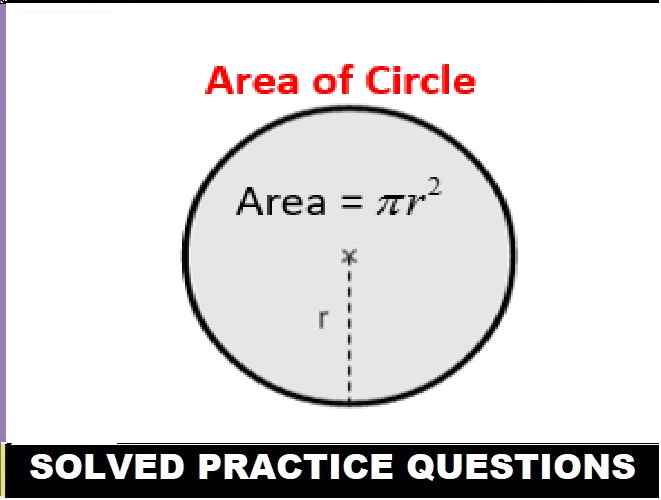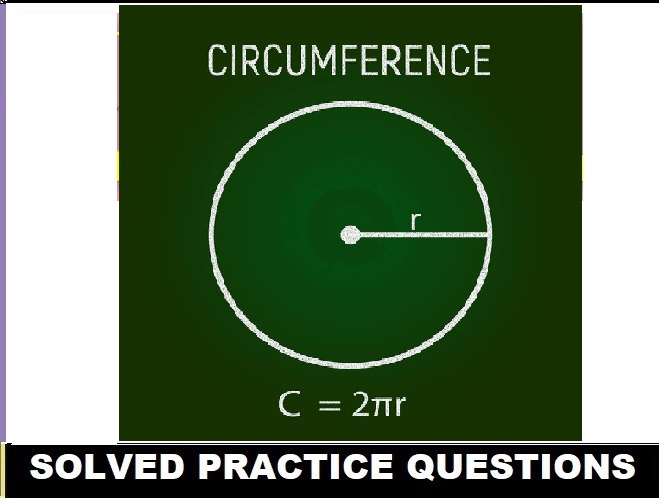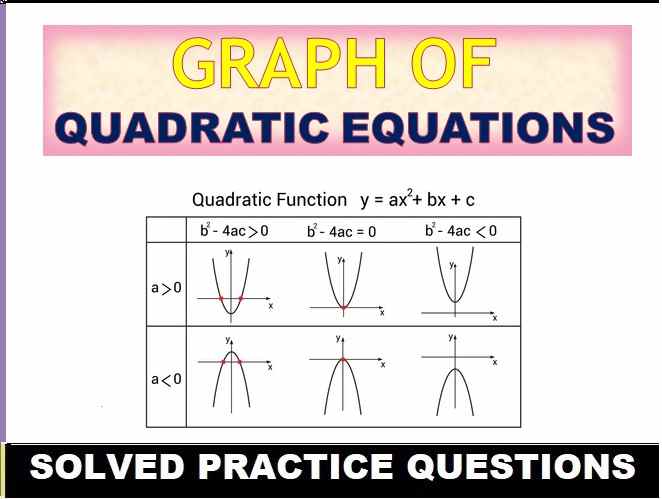Concise Solution Chapter 3 Shares and Dividends ICSE Maths Class 10th.This post is Solution of Chapter –3 Shares and Dividends of Concise Solution which is very famous Maths writer in ICSE Board in Maths Publication .Step by Step Solution of Chapter-3 Shares and Dividends is given to understand the topic clearly . Chapter Wise Solution of Concise Solution including Chapter -3 Shares and Dividends is very help full for ICSE Class 10th student appearing in 2020 exam of council.
Concise Solution Chapter 3 Shares and Dividends ICSE Maths Class 10th
We are providing valuable and important information for Concise Solution Chapter 3 Shares and Dividends ICSE Maths Class 10th. Students with the help of word wide math expert. the main ICSE Math Class 10th Books witter like Concise Solution Selina Publications, R S Aggarwal, R D Sharma , has been expertly solve by our experience teachers team. Our solution is famous is not only in India but also across the globe since decade and students can achieve their goal in 2020 exams of ICSE Class 10th.
Select Topics Concise Solution Chapter 3 Shares and Dividends ICSE Maths Class 10th
Exercise – 3.(A) , Exercise – 3.(B) , Exercise 3.(C) ,
Note:- Before viewing Solution of Chapter -3 Shares and Dividends of Concise Solution read the Chapter Carefully then solve all example of your text book. The Chapter 3 Shares and Dividends is main Chapter in ICSE board .
How To Solve ICSE Class 10th Maths Selina Publications Concise
How to solve ICSE Maths Class 10th : We should follow following rules strictly. know all the formula and concept Chapter Wise then we should solve the ICSE Maths Class 10th example different type questions. use prescribe ( According Council Prescribed Method of ICSE) method to solve ICSE Maths Class 10th . If it is given in question otherwise you should use any type method to solve ICSE Maths Class 10th. Write all step with statement and correct unit during solving if you change one unit to other unit then indicate the conversion scale used in bracket just right side. Note . Solution Of Different witter Solution Below Here.
Concise Solution Chapter- 3 Shares and Dividends Exercise – 3 (A), ICSE Maths Class 10th
Question 1
How much money will be required to buy 400, Rs.12.50 shares at a premium of Rs.1?
Answer 1

Question 2
How much money will be required to buy 250, Rs.15 shares at a discount of Rs.1.50?
Answer 2

Question 3
A person buys 120 shares at a nominal value of Rs40 each, which he sells at Rs42.50 each. Find his profit and profit percent.
Answer 3
Nominal value of 120 shares= Rs40 ![]() 120= Rs4,800
120= Rs4,800
Market value of 120 shares= Rs42.50 ![]() 120= Rs5,100
120= Rs5,100
His profit = Rs5,100 – Rs4,800= Rs300 Ans.

Question 4
Find the cost of 85 shares of Rs60 each when quoted at Rs63.25.
Answer 4
Market value of 1 share= Rs63.25
Market value of 85 shares= Rs63.25 ![]() 85= Rs5,376.25 Ans.
85= Rs5,376.25 Ans.
Question 5
A man invests Rs800 in buying Rs5 shares and when they are selling at a premium of Rs1.15, he sells all the shares. Find his profit and profit percent.
Answer 5
Nominal value of 1 share= Rs5
Market value 1 share= Rs5 + Rs1.15= Rs6.15
Total money invested= Rs800
![]()
Market value of 160 shares= 160 x 6.15= Rs984
His profit = Rs984 – Rs800= Rs184 Ans.

Question 6
Find the annual income derived from 125, Rs.120 shares paying 5% dividend.
Answer 6

Question 7
A man invests Rs3,072 in a company paying 5% per annum, when its Rs10 share can be bought for Rs16 each. Find :
(i)his annual income
(ii)his percentage income on his investment.
Answer 7
Market value of 1 share= Rs16
Nominal value of 1share= Rs10
Money invested= Rs3,072
![]()
Nominal value of 192 shares= 10 x 192= Rs1,920

Question 8
A man invests Rs7,770 in a company paying 5% dividend when a share of nominal value of Rs100 sells at a premium of Rs5. Find:
(i)the number of shares bought;
(ii)annual income;
(iii)percentage income.
Answer 8
Total money invested= Rs7,770
Nominal value of 1 share= Rs100
Market value of 1 share= Rs100+ Rs5= Rs105
![]()
Nominal value of 74 shares= 74 x 100= Rs7,400
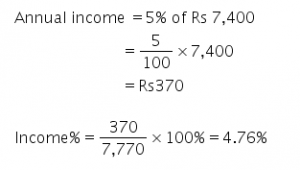
Question 9
A man buys Rs50 shares of a company, paying 12% dividend, at a premium of Rs10. Find:
(i)the market value of 320 shares;
(ii)his annual income;
(iii)his profit percent.
Answer 9
Nominal value of 1 share= Rs50
Market value of 1 share= Rs50+ Rs10= Rs60
and Market value of 320 shares= 320 x 60 = Rs19,200
Nominal value of 320 shares= 320 x 50= Rs16,000
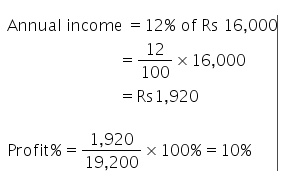
Question 10
A man buys Rs75 shares at a discount of Rs15 of a company paying 20% dividend. Find:
(i)the market value of 120 shares;
(ii)his annual income;
(iii)his profit percent.
Answer 10
Nominal value of 1 share= Rs75
Market value of 1 share= Rs75 – Rs15= Rs60
Market value of 120 shares= 120 x 60= Rs7,200
Nominal value of 120 shares= 120 x 75= Rs9,000
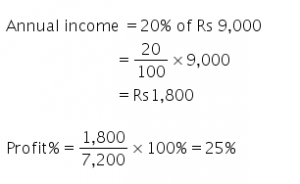
Question 11
A man has 300, Rs50 shares of a company paying 20% dividend. Find his net income after paying 3% income tax.
Answer 11
Nominal value of 1 share= Rs50
Nominal value of 300 shares= 300 x 50 = Rs15,000
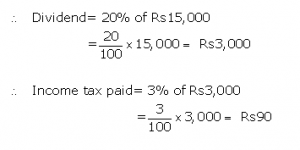
His net income= Rs3,000 – Rs90= Rs2,910 Ans.
Question 12
A company pays a dividend of 15% on its ten-rupee shares from which it deducts income tax at the rate of 22%. Find the annual income of a man who owns one thousand shares of this company.
Answer 12
Nominal value of 1 share= Rs10
Nominal value of 1000 shares= 1000 x 10 = Rs10,000
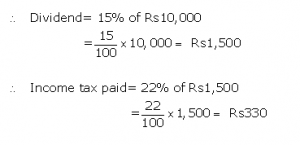
His net income= Rs1,500 – Rs330= Rs1,170 Ans.
Question 13
A man invests Rs8,800 in buying shares of a company of face value of rupees hundred each at a premium of 10%. If he earns Rs1,200 at the end of the year as dividend, find:
(i)the number of shares he has in the company.
(ii)the dividend percent per share.
Answer 13
Total investment= Rs8,800
Nominal value of 1 share= Rs100
Market value of 1 share= Rs110
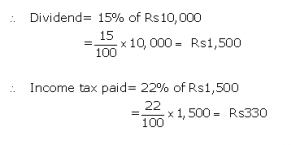
Nominal value of 80 shares= 80 x 100= Rs8,000
Let dividend%= y%

Question 14
A man invests Rs1,680 in buying shares of nominal value Rs24 and selling at 12% premium. The dividend on the shares is 15% per annum. Calculate:
(i)the number of shares he buys;
(ii)the dividend he receives annually.
Answer 14
Nominal value of 1 share= Rs24
Market value of 1 share= Rs24+ 12% of Rs24
= Rs24+ Rs2.88= Rs26.88
Total investment= Rs1,680

Nominal value of 62.5 shares= 62.5 x 24= Rs1,500

Question 15
By investing Rs7,500 in a company paying 10percent dividend, an annual income of Rs500 is received. What price is paid for each of Rs100 share ?
Answer 15
Total investment= Rs7,500
Nominal value of 1 share= Rs100
No. of shares purchased= y
Nominal value of y shares= 100 x y= Rs(100y)
Dividend%= 10%
Dividend = Rs500
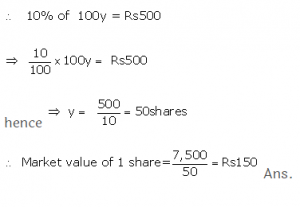
Chapter 3 Shares and Dividends Concise Solution ICSE Maths Class 10th
Exercise Ex.- 3(B)
Question 1
A man buys 75, Rs100 shares paying 9 percent dividend. He buys shares at such a price that he gets 12percent of his money. At what price did he buy the shares ?
Answer 1
Nominal value of 1share= Rs100
Nominal value of 75 shares= 100 75= Rs7,500
Dividend% = 9%

Let market price of 1 share= Rsy
Then market price of 75 shares= Rs75y
Profit% on investment= 12%

Question 2
By purchasing Rs25 gas shares for Rs40 each, a man gets 4percent profit on his investment. What rate percent is the company paying? What is his dividend if he buys 60 shares?
Answer 2
Nominal value of 1 share= Rs25
Market value of 1 share= Rs40
Profit% on investment= 4%
Then profit on 1 share = 4% of Rs40= Rs1.60
Ans.![]()
No. of shares purchased= 60
Then dividend on 60 shares= 60 ![]() Rs1.60= Rs96 Ans.
Rs1.60= Rs96 Ans.
Question 3
Hundred rupee shares of a company are available in the market at a premium of Rs20. Find the rate of dividend given by the company, when a man’s return on his investment is 15%.
Answer 3
Nominal value of 1 share= Rs100
Market value of 1 share= Rs100+ Rs20= Rs120
Profit% on investment of 1 share=15%
Then profit= 15% of Rs120= Rs18
Ans.![]()
Question 4
Rs 50 shares of a company are quoted at a discount of 10%. Find the rate of dividend given by the company, the return on the investment on these shares being 20 percent.
Answer 4
Nominal value of 1 share= Rs50
Market value of 1 share= Rs50 – 10% of Rs50
= Rs50 – Rs5= Rs45
Profit % on investment= 20%
Then profit on 1 share= 20% of Rs45= Rs9
Ans. ![]()
Question 5
A company declares 8 percent dividend to the share holders. If a man receives Rs2,840 as his dividend, find the nominal value of his shares.
Answer 5
Dividend% = 8%
Dividend = Rs2,840
Let nominal value of shares= Rsy

Question 6
How much should a man invest in Rs100 shares selling at Rs110 to obtain an annual income of Rs1,680, if the dividend declared is 12%?
Answer 6
Nominal value of 1 share= Rs100
Market value of 1 share= Rs110
Let no. of shares purchased= n
Then nominal value of n shares= Rs(100n)
Dividend%= 12%
Dividend= Rs1,680

Then market value of 140 shares= 140![]() 110= Rs15,400 Ans.
110= Rs15,400 Ans.
Question 7
A company declares a dividend of 11.2% to all its share-holders. If its Rs60 share is available in the market at a premium of 25%, how much should Rakesh invest, in buying the shares of this company, in order to have an annual income of Rs1,680?
Answer 7
Nominal value of 1 share= Rs60
Market value of 1 share= Rs60+ 25% of Rs60
= Rs60+ Rs15= Rs75
Let no. of shares purchased= n
Then nominal value of n shares= Rs(60n)
Dividend%= 11.2%
Dividend= Rs1,680

Then market value of 250 shares= 250 ![]() 75= Rs18,750 Ans.
75= Rs18,750 Ans.
Question 8
A man buys 400, twenty-rupee shares at a premium of Rs4 each and receives a dividend of 12%. Find:
(i)the amount invested by him.
(ii)his total income from the shares.
(iii)percentage return on his money.
Answer 8
Nominal value of 1 share= Rs20
Market value of 1 share= Rs20+Rs4= Rs24
No. of shares purchased= 400
Nominal value of 400 shares= 400 x 20= Rs8,000
(i)Market value of 400 shares= 400 x 24= Rs9,600
(ii)Dividend%= 12%
Dividend = 12% of Rs8,000
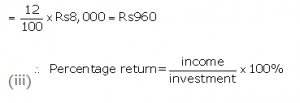
Question 9
A man buys 400, twenty-rupee shares at a discount of 20% and receives a return of 12% on his money. Calculate:
(i)the amount invested by him.
(ii)the rate of dividend paid by the company.
Answer 9
Nominal value of 1 share= Rs20
Market value of 1 share= Rs20 – 20% of Rs20
= Rs20 – Rs4 = Rs16
No. of shares purchased= 400
Nominal value of 400 shares= 400 x 20= Rs8,000
(i)Market value of 400 shares= 400 x 16= Rs6,400
(ii)Return%= 12%
Income= 12% of Rs6,400
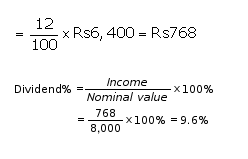
Question 10
A company, with 10,000 shares of Rs100 each, declares an annual dividend of 5%.
(i)What is the total amount of dividend paid by the company?
(ii)What should be the annual income of a man who has 72 shares in the company?
(iii)If he received only 4% of his investment, find the price he paid for each share.
Answer 10
Nominal value of 1 share= Rs100
Nominal value of 10,000shares =10,000 x Rs100= Rs10,00,000
(i)Dividend%= 5%
Dividend = 5% of Rs10,00,000
![]()
(ii)Nominal value of 72 shares= Rs100 x 72= Rs7,200
Dividend= 5% of Rs7,200
![]()
(iii)Let market value of 1 share= Rs y
Then market value of 10,000 shares= Rs(10,000y)
Return%= 4%

Question 11
A lady holds 1800, Rs100 shares of a company that pays 15% dividend annually. Calculate her annual dividend. If she had bought these shares at 40% premium, what is the return she gets as percent on her investment. Give your answer to the nearest integer.
Answer 11
Nominal value of 1 share= Rs100
Market value of 1 share= Rs100+40% of Rs100
= Rs100+Rs40= Rs140
No. of shares purchased= 1800
Nominal value of 1800 shares= 1800 x 100= Rs1,80,000
Market value of 1800 shares= 1800 x 140 = Rs2,52,000
(i)Dividend%= 15%
Dividend = 15% of Rs1,80,000
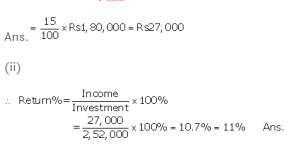
Question 12
A man invests Rs11,200 in a company paying 6 percent per annum when its Rs 100 shares can be bought for Rs140. Find:
(i)his annual dividend
(ii)his percentage return on his investment.
Answer 12
Nominal value of 1 share= Rs100
Market value of 1 share= Rs140
Total investment= Rs11,200
![]()
Then nominal value of 80 shares= 80 x 100= Rs8,000
(i)Dividend%= 6%
Dividend= 6% of Rs8,000
![]()
(ii)
Question 13
Mr. Sharma has 60 shares of nominal value Rs100 and sells them when they are at a premium of 60%. He invests the proceeds in shares of nominal value Rs50, quoted at 4% discount, and paying 18% dividend annually. Calculate :
(i)the sale proceeds
(ii)the number of shares he buys and
(iii)his annual dividend from the shares.
Answer 13
1st case
Nominal value of 1 share= Rs100
Nominal value of 60 shares= Rs100 x 60= Rs6,000
Market value of 1 share= Rs100+ 60% of Rs100
= Rs100+ Rs60= Rs160
Market value of 60 shares= Rs160 x 60= Rs9,600 Ans.
(ii)Nominal value of 1 share= Rs50
Market value of 1 share= Rs50 – 4% of Rs50
= Rs50 – Rs2= Rs48
Ans.![]()
(iii)Nominal value of 200 shares=Rs50 x 200= Rs10,000
Dividend%= 18%
Dividend= 18% of Rs10,000
Ans.![]()
Question 14
A company with 10,000 shares of nominal value Rs100 declares an annual dividend of 8% to the share-holders.
(i)Calculate the total amount of dividend paid by the company.
(ii)Ramesh had bought 90 shares of the company at Rs150 per share. Calculate the dividend he receives and the percentage of return on his investment.
Answer 14
(i)
Nominal value of 1 share= Rs100
Nominal value of 10,000 shares= Rs100 x 10,000= Rs10,00,000
Dividend%= 8%
Dividend = 8% of Rs10,00,000
![]()
(ii)
Market value of 90 shares= Rs150 x 90= Rs13,500
Nominal value of 90 shares= Rs100 x 90= Rs9,000
Dividend = 8% of Rs9,000
![]()
(iii)

Question 15
Which is the better investment :
16% Rs.100 shares at 80 or 20% Rs.100 shares at 120?
Answer 15
1st case
16%Rs.100 shares at 80 means;
Market value of 1 share= Rs80
Nominal value of 1 share= Rs100
Dividend= 16%
Income on Rs80= 16% of Rs100= Rs16
Income on Rs1![]()
2nd case
20% Rs.100 shares at 120 means;
Market value of 1 share= Rs120
Nominal value of 1 share= Rs100
Dividend= 20%
Income on Rs120= 20% of Rs100= Rs20
Income on Rs1![]()
Then 16% Rs.100 shares at 80 is better investment.
Question 16
A man has a choice to invest in hundred-rupee shares of two firms at Rs120 or at Rs132. The first firm pays a dividend of 5% per annum and the second firm pays a dividend of 6% per annum. Find: (i)which company is giving a better return.
(ii)if a man invests Rs26,400 with each firm, how much will be the difference between the annual returns from the two firms.
Answer 16
(i)
1st firm
Market value of 1 share= Rs120
Nominal value of 1 share= Rs100
Dividend= 5%
Income on Rs120= 5% of Rs100= Rs5
Income on Rs1![]()
2nd firm
Market value of 1 share= Rs132
Nominal value of 1 share= Rs100
Dividend= 6%
Income on Rs132= 6% of Rs100= Rs6
Income on Rs1![]()
Then investment in second company is giving better return Ans.
(ii)
Income on investment of Rs26,400 in first firm
![]()
Income on investment of Rs26,400 in second firm

Question 17
A man bought 360, ten-rupee shares of a company, paying 12% per annum. He sold the shares when their price rose to Rs21 per share and invested the proceeds in five-rupee shares paying 4.5 percent per annum at Rs3.50 per share. Find the annual change in his income.
Answer 17
1st case
Nominal value of 1 share= Rs10
Nominal value of 360 shares= Rs10 x 360= Rs3,600
Market value of 1 share= Rs21
Market value of 360 shares= Rs21 x 360= Rs7,560
Dividend%= 12%
Dividend= 12% of Rs3,600
![]()
2nd case
Nominal value of 1 share= Rs5
Market value of 1 share= Rs3.50
![]()
Nominal value of 2160 shares=Rs5 x 2160= Rs10,800
Dividend%= 4.5%
Dividend= 4.5% of Rs10,800
![]()
Annual change in income= Rs486 – Rs432
= Rs54 increase Ans.
Question 18
A man sold 400 (Rs20) shares of a company, paying 5% at Rs18 and invested the proceeds in (Rs10) shares of another company paying 7% at Rs12. How many (Rs10) shares did he buy and what was the change in his income?
Answer 18
1st case
Nominal value of 1 share= Rs20
Nominal value of 400 shares= Rs20 x 400= Rs8,000
Market value of 1 share= Rs18
Market value of 400 shares= Rs18 x 400= Rs7,200
Dividend%= 5%
Dividend= 5% of Rs8,000
![]()
2nd case
Nominal value of 1 share= Rs10
Market value of 1 share= Rs12
Ans.![]()
Nominal value of 600 shares=Rs10 x 600= Rs6,000
Dividend%= 7%
and Dividend= 7% of Rs6,000
![]()
Annual change in income= Rs420 – Rs400
= Rs20 increase Ans.
Question 19
Two brothers A and B invest Rs16,000 each in buying shares of two companies. A buys 3% hundred-rupee shares at 80 and B buys ten-rupee shares at par. If they both receive equal dividend at the end of the year, find the rate per cent of the dividend received by B.
Answer 19
For A
Total investment= Rs16,000
Nominal value of 1 share= Rs100
Market value of 1 share= Rs80
![]()
Nominal value of 200 shares= Rs100 x 200= Rs20,000
Dividend%= 3%
so Dividend = 3% of Rs20,000
![]()
For B
Total investment= Rs16,000
Nominal value of 1 share= Rs10
Market value of 1 share= Rs10
![]()
Nominal value of 1600shares= 10 x 1600= Rs16,000
Dividend received by B= Dividend received by A
= Rs600

Question 20
A man invests Rs20,020 in buying shares of nominal value Rs26 at 10% premium. The dividend on the shares is 15% per annum. Calculate : (i)the number of shares he buys.
(ii)the dividend he receives annually.
(iii)the rate of interest he gets on his money.
Answer 20
Total investment= Rs20,020
Nominal value of 1 share= Rs26
Market value of 1 share= Rs26+ 10% of Rs26
= Rs26+ Rs2.60= Rs28.60
Ans.![]()
Nominal value of 700 shares= Rs26 x 700= Rs18,200
Dividend%= 15%
and Dividend= 15% of Rs18,200
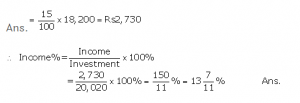
Shares and Dividends Concise Solution Chapter 3 ICSE Maths Class 10th
Exercise -3(C)
Question 1
By investing Rs.45,000 in 10% Rs.100 shares, Sharad gets Rs.3,000 as dividend. Find the market value of each share.
Answer 1

Question 2
Mrs. Kulkarni invests Rs.1, 31,040 in buying Rs.100 shares at a discount of 9%. She sells shares worth Rs.72,000 at a premium of 10% and the rest at a discount of 5%. Find her total gain or loss on the whole.
Answer 2
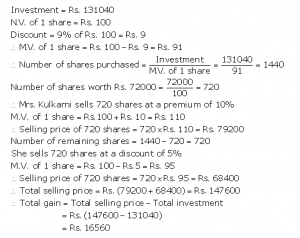
Question 3
A man invests a certain sum on buying 15% Rs.100 shares at 20% premium. Find :
(i) His income from one share
(ii) The number of shares bought to have an income, from the dividend, Rs.6480
(iii) Sum invested
Answer 3
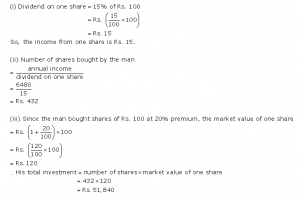
Question 4
Gagan invested Rs.80% of his savings in 10% Rs.100 shares at 20% premium and the rest of his savings in 20% Rs.50 shares at Rs.20% discount. If his incomes from these shares is Rs.5,600 calculate:
(i) His investment in shares on the whole
(ii) The number of shares of first kind that he bought
(iii) Percentage return, on the shares bought on the whole.
Answer 4
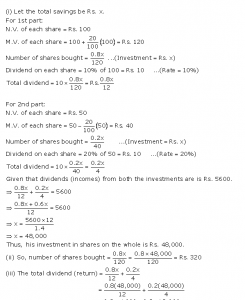

Question 5
Ashwarya bought 496, Rs.100 shares at Rs.132 each, find :
(i) Investment made by her
(ii) Income of Ashwarya from these shares, if the rate of dividend is 7.5%.
(iii) How much extra must ashwarya invest in order to increase her income by Rs.7,200
Answer 5
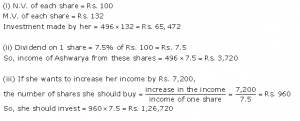
Question 6
Gopal has some Rs.100 shares of company A, paying 10% dividend. He sells a certain number of these shares at a discount of 20% and invests the proceeds in Rs.100 shares at Rs.60 of company B paying 20% dividend. If his income, from the shares sold, increases by Rs.18,000, find the number of shares sold by Gopal.
Answer 6
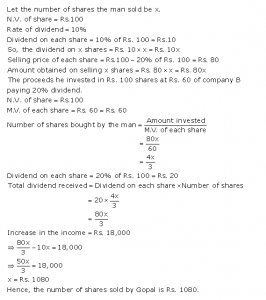
Question 7
A man invests a certain sum of money in 6% hundred-rupee shares at Rs.12 premium. When the shares fell to Rs.96, he sold out all the shares bought and invested the proceed in 10%, ten-rupee shares at Rs.8. If the change in his income is Rs.540, Find the sum invested originally
Answer 7
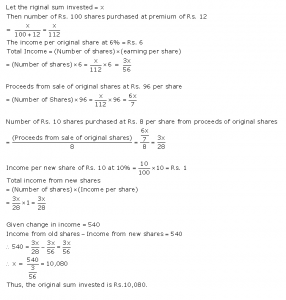
Question 8
Mr. Gupta has a choice to invest in ten-rupee shares of two firms at Rs13 or at Rs16. If the first firm pays 5% dividend and the second firm pays 6% dividend per annum, find:
(i)which firm is paying better.
(ii)if Mr. Gupta invests equally in both the firms and the difference between the returns from them is Rs30, find how much, in all, does he invest.
Answer 8
(i)
1st firm
Nominal value of 1 share= Rs10
Market value of 1 share= Rs13
Dividend%= 5%
so Dividend = 5% of Rs10= Rs0.50
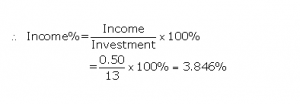
2nd firm
Nominal value of 1 share= Rs10
Market value of 1 share= Rs16
Dividend%= 6%
hence Dividend = 6% of Rs10= Rs0.60

Then first firm is paying better than second firm.
(ii)
Let money invested in each firm= Rs y
For 1st firm
![]()
Total dividend ![]()
For 2nd firm
![]()
Total dividend ![]()
Given- difference of both dividend= Rs30

Total money invested in both firms= Rs31,200 2
= Rs62,400 Ans.
Question 9
Ashok invested Rs.26,400 in 12%, Rs.25 shares of a company. If he receives a dividend of Rs.2,475, find the:
(i) number of shares he bought.
(ii) market value of each share.
Answer 9
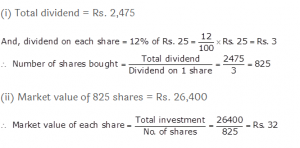
Question 10
A man invested Rs45,000 in 15% Rs100shares quoted at Rs125. When the market value of these shares rose to Rs140, he sold some shares, just enough to raise Rs8,400. Calculate:
(i)the number of shares he still holds;
(ii)the dividend due to him on these remaining shares.
Answer 10
(i)
Total investment= Rs45,000
Market value of 1 share= Rs125
![]()
Nominal value of 360 shares= Rs100 x 360= Rs36,000
Let no. of shares sold= n
Then sale price of 1 share= Rs140
Total sale price of n shares= Rs8,400
Then ![]()
The no. of shares he still holds= 360 – 60= 300
(ii)
Nominal value of 300 shares= Rs100 300= Rs30,000
Dividend%= 15%
Dividend = 15% of Rs30,000

Question 11
Mr.Tiwari. invested Rs29,040 in 15% Rs100 shares quoted at a premium of 20%. Calculate:
(i)the number of shares bought by Mr. Tiwari.
(ii)Mr. Tiwari’s income from the investment.
(iii)the percentage return on his investment.
Answer 11
Total investment= Rs29,040
Nominal value of 1 share= Rs100
Market value of 1 share= Rs100+ 20% of Rs100
= Rs100 + Rs20=Rs120
![]()
Nominal value of 242 shares= Rs100 x 242= Rs24,200
Dividend%= 15%
Dividend= 15% of Rs24,200


Question 12
A dividend of 12% was declared on Rs150 shares selling at a certain price. If the rate of return is 10%, calculate:
(i)the market value of the shares.
(ii)the amount to be invested to obtain an annual dividend of Rs1,350.
Answer 12
(i)Nominal value of 1 share= Rs150
Dividend%= 12%
Dividend on I share= 12% of Rs150
![]()
Let market value of 1 share= Rs y
Return%= 10%

(ii)when dividend is Rs18, then investment is Rs180
When dividend is Rs1,350, then investment
![]()
=Rs 13, 500
Question 13
Divide Rs50,760 into two parts such that if one part is invested in 8% Rs100 shares at 8% discount and the other in 9% Rs100 shares at 8% premium, the annual incomes from both the investments are equal.
Answer 13
Total investment= Rs50,760
Let 1st part= Rs y
2nd part= Rs(50,760-y)
For 1st part
Nominal value of 1 share= Rs100
Market value of 1 share= Rs100 – 8% of Rs100
= Rs100 – Rs8= Rs92
![]()
Dividend%= 8%
Dividend on 1 share= 8% of Rs100= Rs8
Total dividend![]()
For 2nd part
Nominal value of 1 share= Rs100
Market value of 1 share= Rs100 + 8% of Rs100
= Rs100 + Rs8= Rs108
![]()
Dividend%= 9%
Dividend on 1 share= 9% of Rs100= Rs9
Total dividend![]()
Given that both dividend are equal
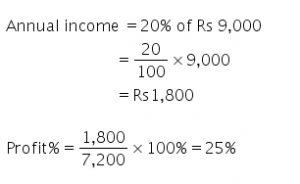
1st part= Rs24,840
2nd part= Rs50760 – Rs24,840= Rs25,920 Ans.
Question 14
Mr. Shameem invested of his savings in 20% Rs50 shares quoted at Rs60 and the remainder of the savings in 10% Rs100 share quoted at Rs110. If his total income from these investments is Rs9,200; find :
(i)his total savings (ii)the number of Rs50 share
(iii)the number of Rs100 share.
Answer 14
Let his total savings is Rs y
1st case
His saving= ![]() of y = Rs
of y = Rs ![]()
Market price of 1 share= Rs60
Then shares purchased=![]()
Dividend on 1share= 20% of Rs50= Rs10
Total dividend= ![]()
2nd case
His saving= ![]() of y= Rs
of y= Rs![]()
Market price of 1share= Rs110
Then shares purchased =![]()
Dividend on 1share= 10% of Rs100= Rs10
Total dividend= ![]()
According to question
Total income = Rs9,200
![]()

The number of Rs50share= ![]() Ans.
Ans.
The number of Rs100 share= ![]() Ans.
Ans.
Question 15
Vivek invests Rs4,500 in 8%, Rs10 shares at Rs15. He sells the shares when the price rises to Rs30, and invests the proceeds in 12% Rs100 shares at Rs125. Calculate :
(i)the sale proceeds
(ii)the number of Rs125 shares he buys.
(iii)the change in his annual income from dividend.
Answer 15
1st case
Total investment= Rs4,500
Market value of 1 share= Rs15
![]()
Nominal value of 1 share= Rs10
Nominal value of 300 shares= Rs10 300= Rs3,000
Dividend=8% of Rs3,000
![]()
Sale price of 1 share= Rs30
Total sale price= Rs30 x 300= Rs9,000 Ans.
(ii)new market price of 1 share= Rs125
Ans.![]()
(iii)
New nominal value of 1 share= Rs100
New nominal value of 72 shares= Rs100 x 72= Rs7,200
Dividend%= 12%
New dividend= 12% of Rs7,200
![]()
Change in annual income= Rs864 – Rs240
= Rs624 Ans.
Question 16
Mr.Parekh invested Rs.52,000 on Rs.100 shares at a discount of Rs.20 paying 8% dividend. At the end of one year he sells the shares at a premium of Rs.20. Find:
(i)The annual dividend
(ii)The profit earned including his dividend.
Answer 16
Rate of dividend = 8%
Investment = Rs.52000
Market Rate = Rs.100 – 20 = Rs.80
No. of shares purchased = ![]()
(i) Annual dividend = 650 × 8 = Rs.5200 Ans.
(ii) On selling, market rate = Rs.100+20 = Rs.120
 Sale price = 650 × 120 = Rs.78000
Sale price = 650 × 120 = Rs.78000
Profit = Rs.78000 – Rs.52000 = Rs.26000
 Total gain = 26000 + 5200 = Rs.31200 Ans.
Total gain = 26000 + 5200 = Rs.31200 Ans.
Question 17
Salman buys 50 shares of face value Rs.100 available at Rs.132.
(i) What is his investment?
(ii) If the dividend is 7.5%, what will be his annual income?
(iii) If he wants to increase his annual income by Rs.150, how many extra shares should he buy?
Answer 17
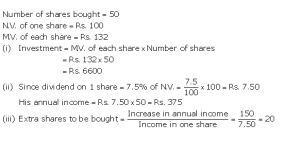
Question 18
Salman invests a sum of money in Rs.50 shares, paying 15% dividend quoted at 20% premium. If his annual dividend is Rs.600, calculate :
(i) The number of shares he bought.
(ii) His total investment.
(iii) The rate of return on his investment.
Answer 18
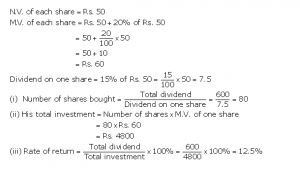
Question 19
Rohit invested Rs. 9,600 on Rs. 100 shares at Rs. 20 premium paying 8% dividend. Rohit sold the shares when the price rose to Rs. 160. He invested the proceeds (excluding dividend) in 10% Rs. 50 shares at Rs. 40. Find the :
(i) Original number of shares.
(ii) Sale proceeds.
(iii) New number of shares.
(iv) Change in the two dividends.
Answer 19
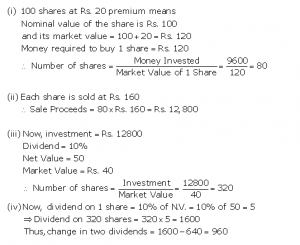
Question 20
How much should a man invest in Rs. 50 shares selling at Rs. 60 to obtain an income of Rs. 450, if the rate of dividend declared is 10%. Also find his yield percent, to the nearest whole number.
Answer 20
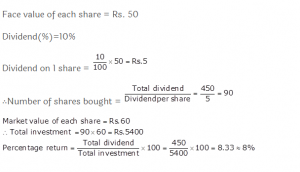
Chapter Wise Solution of Concise (Selina Publications) Mathematics for ICSE Board Class 10th
-
Return to :- Concise Selina Maths Solutions for ICSE Class-10
Thanks
Please share with your friends
